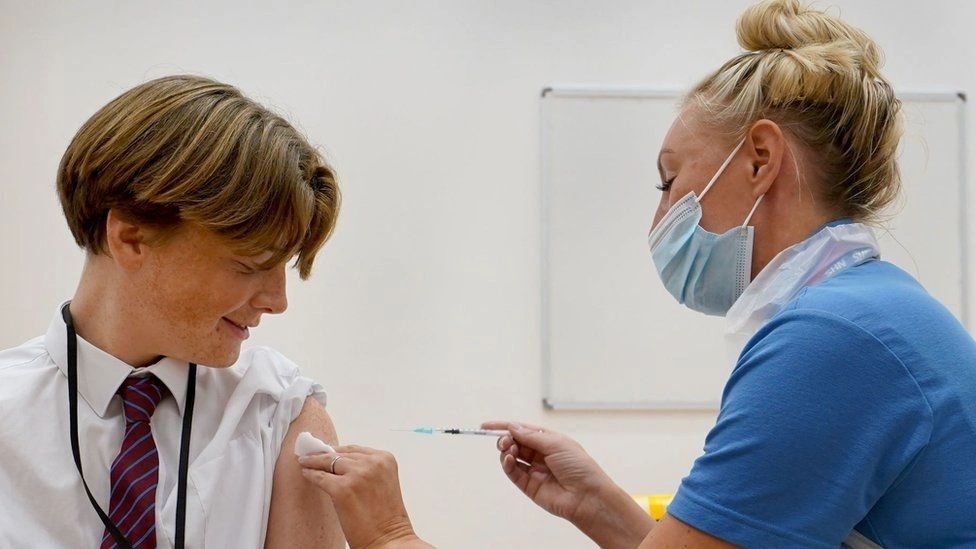
Healthy 12- to 15-year-olds in England and Scotland have begun receiving Covid jabs.
Across the UK, pupils this age are being offered a single Pfizer dose.
How are vaccinations being rolled out?
The jabs are not compulsory but the government hopes offering all healthy 12- to 15-year-olds a single dose of Pfizer will limit school disruption this winter.
Evidence suggests one dose cuts the risk of catching the Delta variant by about 55%. It also reduces the chances of people getting very sick or spreading it to someone else.
The rollout has already begun in England and Scotland. Invites are being sent out in Wales, while in Northern Ireland teen vaccinations are likely to start in October.
The UK’s chief medical offers said a second dose shouldn’t be considered before the spring term.
The vaccine is already available for over-12s with underlying health conditions, or those living with others at high risk.
- Which children are being vaccinated and why?
- What difference will jabbing young teens make?
- Schools warn about hoax anti-vaccine letters

What happens if a pupil tests positive?
Across the UK, all pupils are encouraged to carry on taking twice-weekly lateral flow tests at home.
Pupils who test positive must isolate at home for 10 days but their siblings and parents do not need to quarantine unless they also test positive.
The child – or their parents – will be asked to provide details about close contacts. Any identified children will be asked to take a polymerase-chain-reaction (PCR) swab test..
But unless they test positive themselves, they won’t have to self-isolate and can go to school.
It’s hoped this will avoid whole classes being sent home.
Could schools cause a surge in Covid cases?
The Sage group of scientists warned the government “it is highly likely” that high levels of coronavirus will be seen in schools in England by the end of September.
In Scotland, First Minister Nicola Sturgeon also said reopening schools could lead to a rapid rise in Covid 19 cases.
But the former Education Secretary Gavin Williamson said that it was right for children to have a “much more normal education experience” this term.
He said measures including the mass testing of pupils and staff could allow a “sensible balance”.
- Pupils with suspected Covid urged to stay at home
- Covid outbreak at school sees 18 teachers absent
- Schools at breaking point with Covid, council says
Will pupils still need to socially distance?
Social-distancing measures have been relaxed for schools in England, Wales and Northern Ireland.
Head teachers can decide whether any restrictions are still needed.
Depending on the layout and size of their school, they may choose to keep one-way systems and crowd-control measures in place.

In Scotland, more restrictions are being maintained.
On school premises, all staff must stay at least 1m (3ft) from pupils and colleagues.
- Plan A or Plan B – what could happen this winter?
- Read more about the rules in Scotland
- Read more about the rules in Wales
- Read more about the rules in Northern Ireland
What about face coverings and ventilation?
Face coverings are no longer routinely advised for staff or pupils in schools England and Wales, although they are still recommended in crowded spaces such as on school buses.
But in Scotland, face coverings are required at least until the October half-term. And in Northern Ireland, they are required in class for the first six weeks of term at least.
The Department for Education pledged to provide 300,000 carbon-dioxide monitors to schools in England from September – to help identify where airflow is limited and viruses may more easily spread.
The Welsh government is funding a £6m programme to increase air circulation and purity. Some 30,000 CO2 sensors and 1,800 ozone disinfecting machines will be made available.
Source – BBC News
